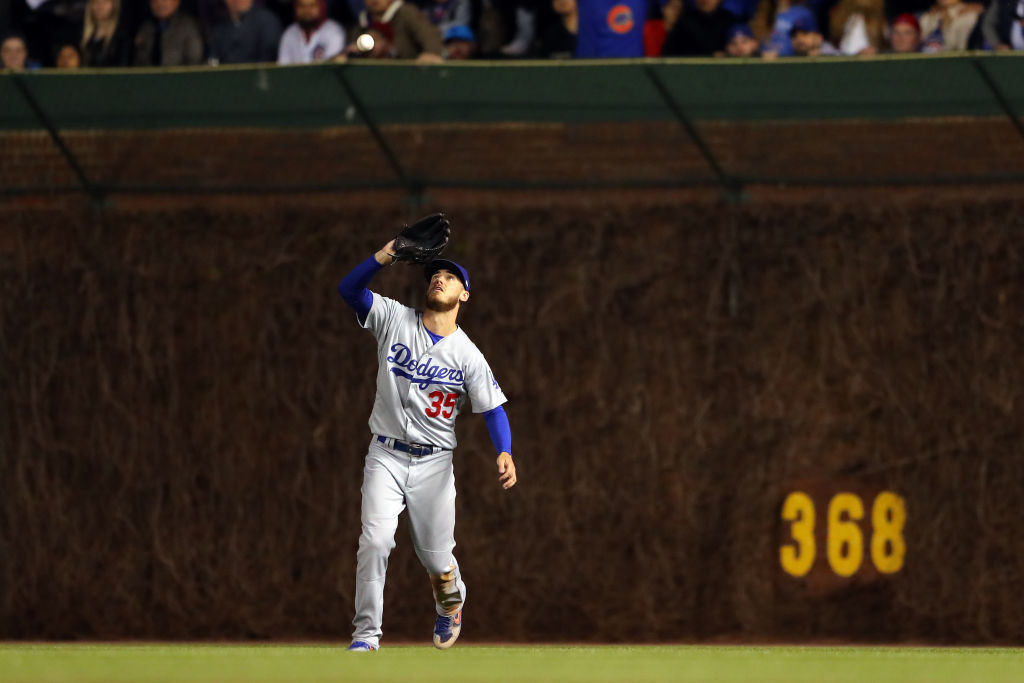Not too long ago, it was easy to imagine Dodgers outfielder/first baseman Cody Bellinger commanding a Judgian contract when he hit baseball's free agent market. As a lanky, easygoing kid from Arizona, Bellinger entered the L.A. system as a fourth-round teen in 2013 and started showing off prodigious power pretty much as soon as he got his feet wet. Games lost to a hip injury foreshadowed future struggles, but whenever he was on the field, Bellinger hit dingers, and there was almost no adjustment period after he was called up in April 2017 for a slow-starting Dodger team that had its eyes on a title.
Immediately, with his longballs and his good looks and the way you could imagine him thinking about tacos every time the cameras caught him in the dugout, Bellinger became one of the team's signature stars. An all-or-nothing swinger who made contact more than often enough to justify his approach, he smashed 39 homers, put up a .933 OPS, and won Rookie of the Year as the Dodgers came within one game of a championship. The next year, he played all 162 games and remained very productive, highlighting his season with multiple clutch moments in the NLCS. And in 2019, still just 23 years old, Bellinger looked like an all-time great in the making, lowering his strikeouts and increasing his walks while crushing 47 homers with an OBP above .400. He won MVP and a Gold Glove that year, and though the playoffs again ended in disappointment, Bellinger seemed primed to lead a franchise that wanted to win more badly than any in MLB, and was willing to spend what it took.
The Dodgers got their World Series wish, kind of, with a championship in a truncated, awkward 2020 season that nobody really likes to remember. But Bellinger himself has looked unrecognizable in his last three seasons. The COVID year was bizarre enough to throw those numbers out, but injuries to his shoulder and leg, combined with a league-wide decline in dongs making his batting style less effective, made Bellinger's 2021 season a miserable one. In 95 games he hit just .165 with 10 homers, and despite salvaging some of his reputation with a few key playoff knocks, he would then struggle to be anything more than mediocre at the plate in 2022, pulling balls into the shift when he wasn't striking out and keeping his place in the order only with above-average center field play, even as his body showed clear signs of wear.
The Dodgers have better options for Bellinger's spot in the older but more recently effective Trayce Thompson and the pleasantly named CF prospect James Outman, plus other current free agents. And as they appear to be tightening up their budget, they non-tendered Bellinger to allow him to walk into free agency. Though teams were definitely interested, the bidding was nothing like it could have been if he'd been able to negotiate his contract after his MVP campaign. (Bellinger made $605,000 in that season.) The Chicago Cubs signed him on Tuesday for basically the same deal he got with L.A. last year: one year, $17.5 million.
The Cubs probably wanted that short deal because Bellinger's health, and his ability to hit at a major-league level, remain real risks. (Pete Crow-Armstrong, who I swear is a real person, is also a highly touted 20-year-old looming in the minors and waiting for his shot in the Cubs' outfield.) But Bellinger's agent, Scott Boras, also talked up the brief nature of the deal, saying his client did get multi-year offers but wanted to up his numbers this year and then test the free-agent market with more leverage next winter.
Chicago front-office boss Jed Hoyer, as I see it now, is being kind of sneaky. After a couple of 70-ish win seasons overshadowed by the departures of almost all of their best and most beloved players, the Cubs have now at least made a few recent choices that stopped them from going all-in on a tank job. Scoring Seiya Suzuki for $85 million and Marcus Stroman for $71 million last offseason was part of that, and adding a serviceable starter in Jameson Taillon on a four-year deal further indicates that they're at least trying to field a real baseball team. (They did just lose Willson Contreras to the Cardinals, but we'll see what comes of the rumblings that they want a marquee shortstop.) In previous eras of MLB, they would still almost definitely be short of relevancy. But in 2023, with the expanded postseason, it is cynical but not unrealistic to believe that the Cubs are trying to do the bare minimum that could give them a shot at lucking into something like the 87 wins that got the Phillies all the way to the World Series last season.
I don't particularly love the idea of aiming for marginal competitiveness, but Bellinger himself should have reason for optimism. His lingering ailments are hopefully healing a little more this offseason; he won't have to worry about extreme defensive shifts in this upcoming campaign; and if the Cubs play a cold first half, he's an appealing candidate to be traded to a contender at the deadline. Everything is set up quite nicely for him to step into this new scenery and find, if not an MVP, a more effective player than he's been in years. Still, these amenable conditions won't matter one bit if Bellinger doesn't hit. He's staking a lot on his belief that he can.






